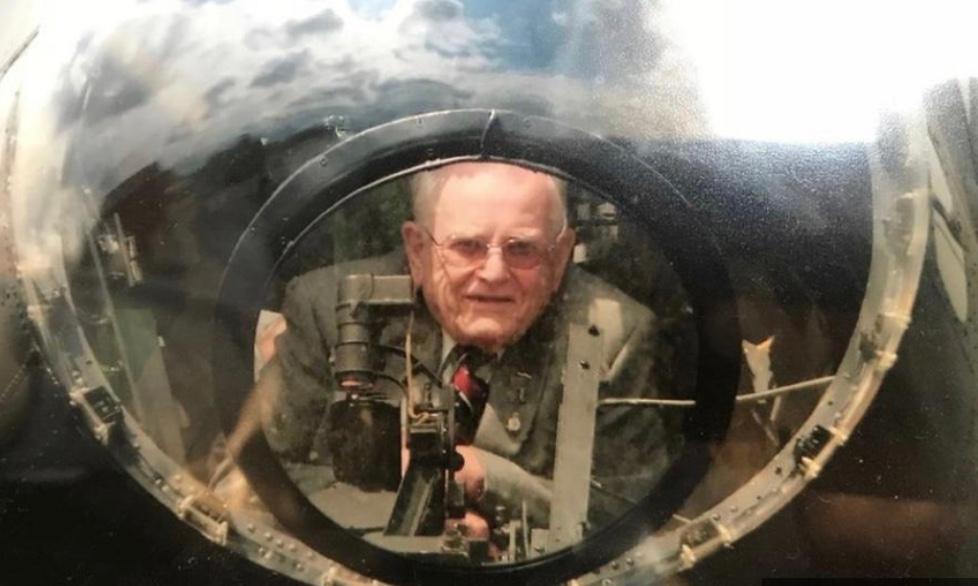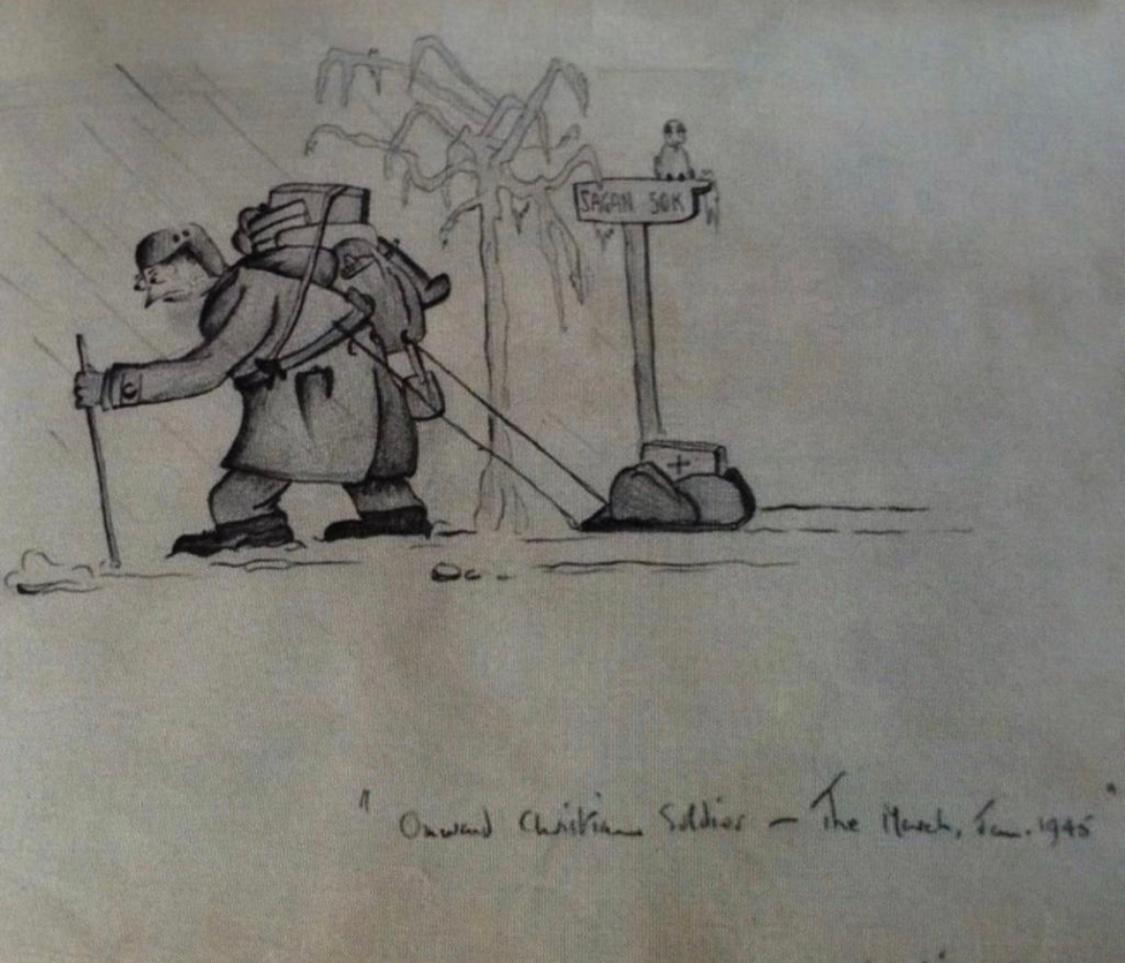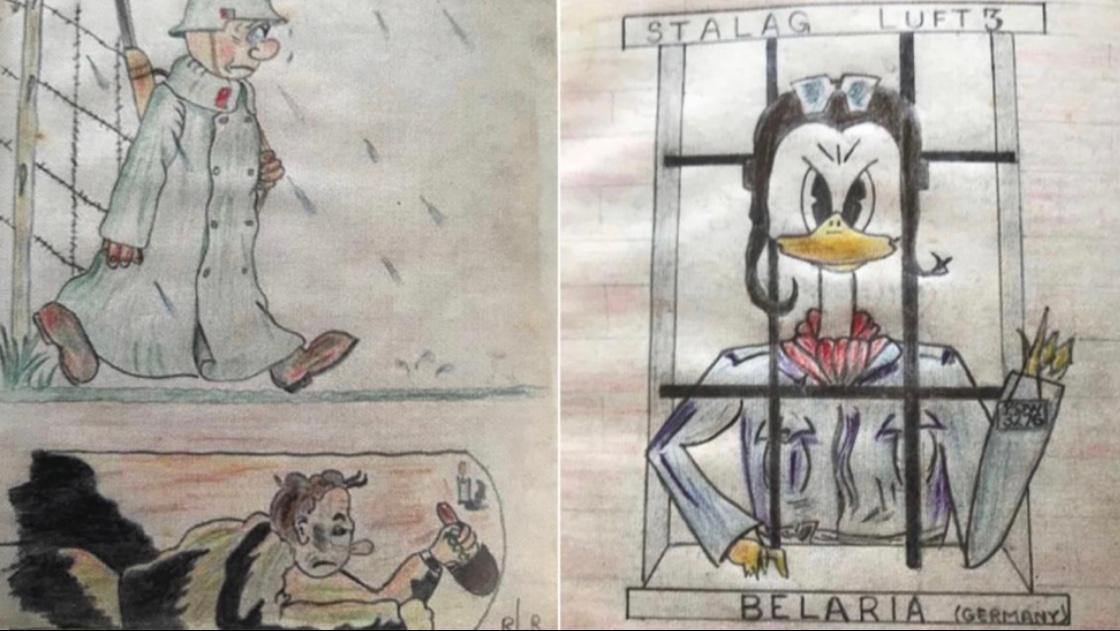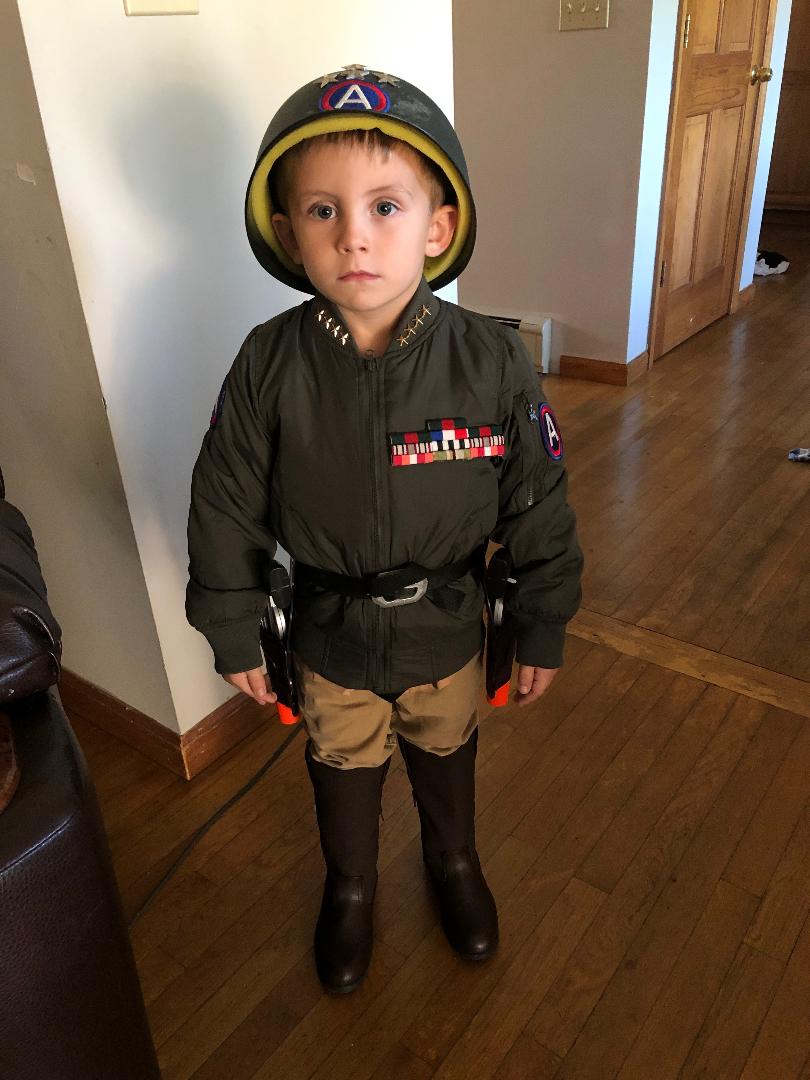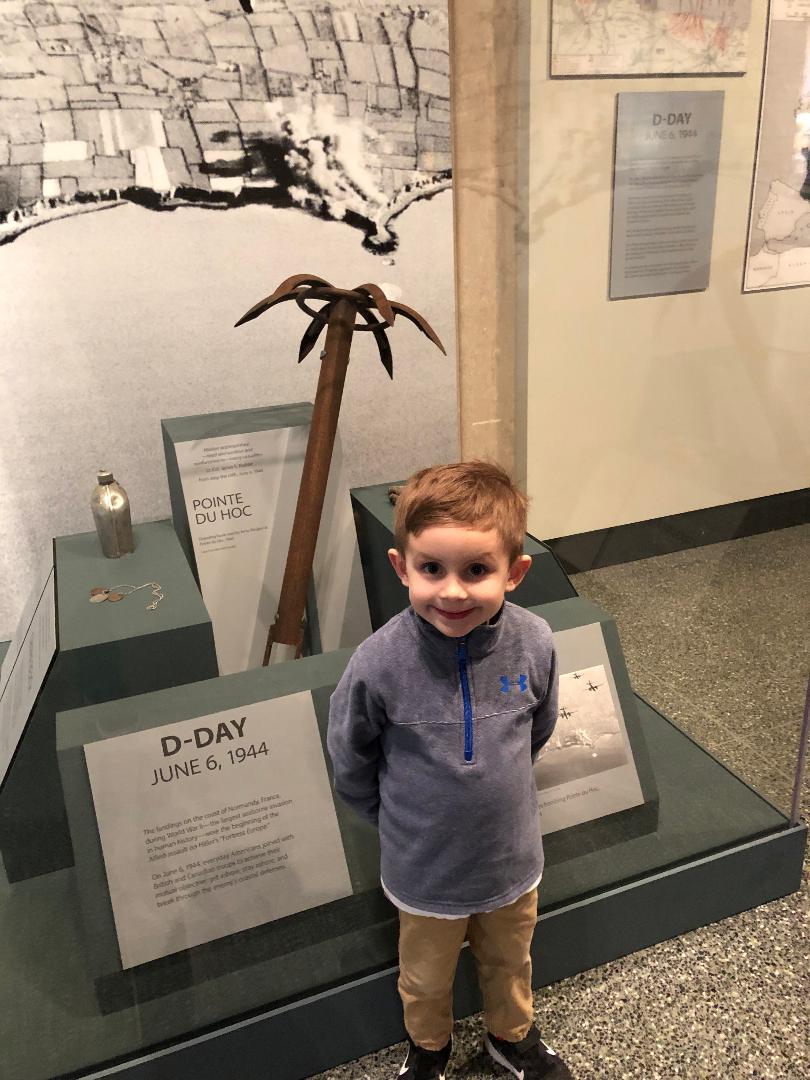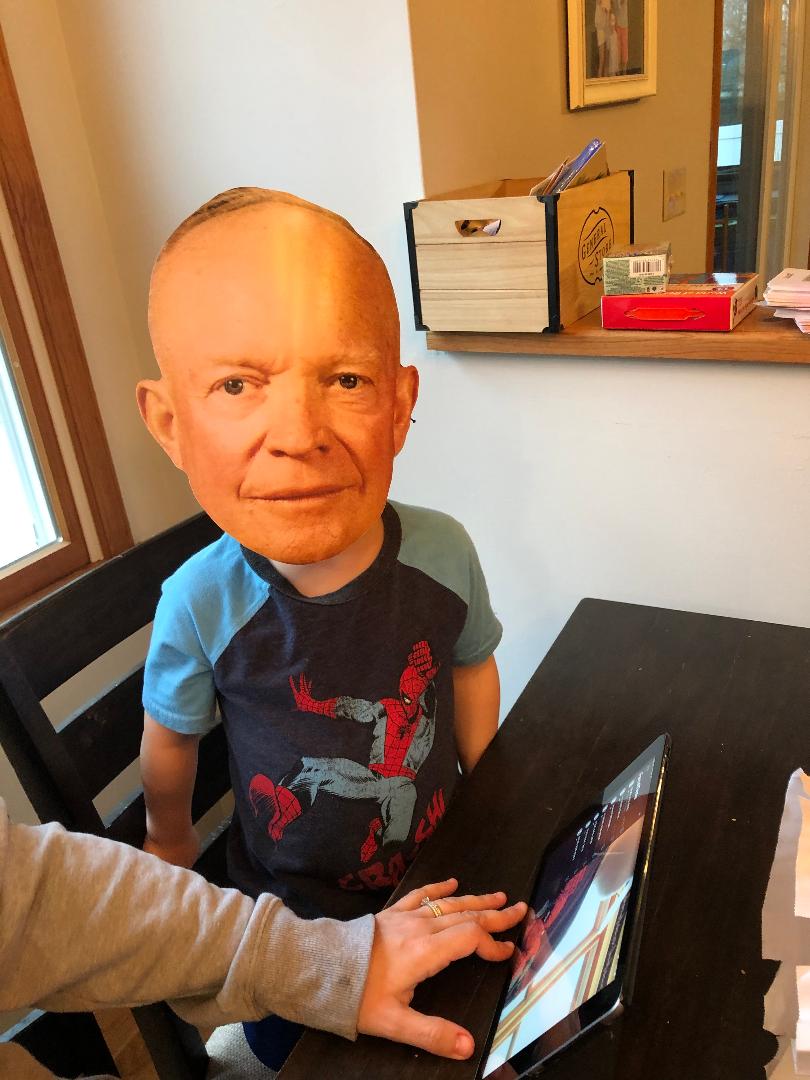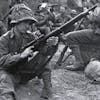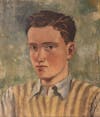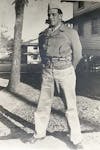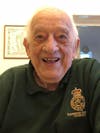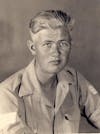55 Les Rutherford interview - Lancaster bomb aimer

Dunkirk escapee and Stalag Luft 3 POW
Les Rutherford was in the 51st Highland Division which formed part of the rear-guard defence, allowing for the evacuation of Dunkirk. He escaped to England in a most novel fashion and later volunteered for the Royal Air Force becoming a bomb aimer on Lancasters, in the second world war.
He completed 23 operations with 50 Squadron from RAF Skellingthorpe but was shot down by a fighter on his 24th operation.
He spent the rest of the war as a prisoner of war at Stalag Luft III, the location of the famed Great Escape.
Feedback/reviews in Apple Podcasts - Thank you.
More great unpublished history!
Second world war

Young Captain James Papalia. 6 years old, nearly 8, from New Jersey and the biggest Eisenhower and World War 2 buff you’ll find!

Les Rutherford in nose cone WWII
Escaping the Russians
"At ease, men"
General Eisenhower visits James Papilia to inspect the troops quarters and also attends a special recording session of the Fighting Through Podcast
International Bomber Command Centre Digital Archive
News article - Tribute to on Les Rutherford
https://www.tasmanchester.com/
City Airport Manchester Facebook page
Interested in Bill Cheall's book? Link here for more information.
Fighting Through from Dunkirk to Hamburg, hardback, paperback and Kindle etc.
Fighting Through Podcast – Episode 55 – Les Rutherford – Lancaster Bomb Aimer
More great unpublished history! WWII
….
Hello again and another warm WW2 welcome to you. I’m Paul Cheall, son of veteran Bill Cheall. The FT podcast features cracking first-hand memoirs and memories of war veterans – and much more.
Today I’ve got an interview for you with the kind permission of the International Bomber Command Centre Digital Archive based at the University of Lincoln in England.
They host a number of veteran interviews which are available for download for free for private use.
In the interview, Les Rutherford describes his escape from Dunkirk upon returning to the United Kingdom and joining 50 Squadron in the Royal Air Force. He also describes his training in South Africa and his experience of being shot down, interrogated and imprisoned in Stalag Luft III.
Before we crack on with the interview I’ve got various bits of news and feedback to share with you, starting with the following:
TR
(Death of Roy )
“I was seventeen when D Day started and my unit landed early in the morning on Juno beach, Normandy.
There was an horrendous noise as we landed, people were dying leaving the landing craft, it was terrible, bullets were crashing all around at our feet and parachutes were falling from the sky”.
That’s a passage from Episode 27 of the fighting through podcast, which was Veterans Bennett and Cheall Remember D-day. Dad was reminiscing about the 50th anniversary visit to France and Roy Bennett was recounting his experience as a royal Marine landing on Juno Beach.
I’ve got some very sad news to share with you now. Family friend of Roy, Jonathan Hill, has written in to tell me the following.
Paul, I just wanted to pass on the sad news that Roy Bennett passed away recently, he was 96. Roy as you may remember served with 48RM Commando and landed on Juno beach on the morning of D Day alongside the Canadians. He was a lovely man and will be missed greatly by friends and family.
Roy did end up in a care home for the last month or so and because of the lock down he couldn’t have any visitors which was very hard for his wife and the rest of the family.
He actually died of heart failure, not of Coronavirus. He slipped away peacefully, and it was a good way to go as he wasn’t really with it any more anyway so didn’t know anything about it. It’s tough times - only Roy’s immediate family are permitted to attend his funeral, not even his grandchildren are allowed to go!
Many years ago Roy wrote this poem which sums things up rather nicely.
Normandy - Roy Bennett (Ex Royal Marines)
Gale force winds have turned to heat, and dust lies on the ground,
Any movement stirs it up, and death falls all around.
Sudden terror grips us all, we hear the dreaded clanks,
Every soldier fears the worst, when faced with Tiger tanks.
Moaning minnies sear the mind, quite different from all others,
Soldiers hug the earth in fear. Some cry for their mothers
The shot, the shell, the mortar, the carnage and the screams.
Will live with us for evermore and haunt us in our dreams.
The teller and the ‘S’ mines, were meant to kill or maim,
They take away your manhood and leave a broken frame.
Sat beside a flowing stream, my head held in my hand,
I dream the dreams of yesterday, in a free, untroubled land.
The battlefield is silent now, the guns have gone to sleep,
While pioneers collect the dead, and stack them in a heap.
RIP Roy – go and meet up with all your old mates from the beaches.
TR
Dave has died
I now have another bit of sad news to share.
It’s the Heartbreaking news that Dave Harrison, co-host of For You The War is Over podcast has died from Covid-19
Deeply saddened to say that one of our hosts, Dave Harrison, passed away of COVID-19 last week.
Dave was passionate and proud of 'For You The War Is Over', and a brilliant presenter and editor. We had some fantastic times recording the episodes together and some awesome plans lined up for future series.
More importantly, he was an amazing friend who will be missed terribly by all who knew him.
I must say I am shocked and very saddened by this news. It’s devastating at so many levels and my condolences go to Dave’s family and friends.
The sister of a best friend of mine has been in hospital with the virus and it now looks as though she’s going to be ok. And two other people in my family circle, in the medical profession have been ill from it.
You know It’s hard to believe what is happening with this virus and it’s yet another war the world is having to fight but on a different level. But it seems every person on this planet is going to be either infected or affected before we’re finished.
I think Dave and Dave, as they became known, made such a bright start with their Podcast and Dave Harrison undoubtedly left his permanent mark in the medium before his premature parting.
I understand that at some point there will be some more unreleased episodes coming out on the podcast so don’t unsubscribe. That’s the FYTWIO podcast.
I’ve got More unfortunate news
Stevie Stevens
I’m sure you remember the interview I recorded with flight Lieutenant Stevie Stevens in the not too distant past. Stevie regaled us with some fascinating tales about being a pilot in a Lancaster, Refusing to countenance the possibility that the word scary could come into his vocabulary. Sadly, Stevie passed away a few weeks ago at his care home in Norfolk. He had a good and dedicated friend in Claire Ling at his side when he died.
I think it was essentially old-age that saw him off and I don’t believe coronavirus played a part. If you want to pay tribute to Stevie, episode 44 is where you will find him in full flow. I feel very proud and privileged that I got to see Stevie and feel quite humble that I was one of the last people to interview him. RIP old chum.
Talking about Lancaster crew, I know Claude Reynolds, rear gunner, is At home and well with plenty of family around.
Just to bring this unfortunate segment of the show to an end I’ll share some more not so good but far from tragic news with you:
Savannah our young American co-host – yes I can call her that she’s featured so many times.
And I don’t know whether to laugh or cry – Cry because she’s broken an arm – laugh, because she did it trying to do handstands. Savannah I bet it hurt like heck as broken limbs often do, so you do have my sympathy, but when you get better you can wear the memory like a badge of honour. Get better soon sweetie.
Feedback
Positive comments from a stack of people for which thank you so much!
Chris Hughes, from Coventry who also sent me a link to an interesting account from an American who landed on Omaha beach. Hopefully I can use that in a future episode.
Brad Mathieson email
E. Anderson-Carroll from the United Kingdom Castbox
Paul Hudson from the United Kingdom
Nigel Graham from the United Kingdom
Great pod cast sir, cheerio - Charles Gould from the United States. Hey hasn’t he pinched that sign off from some other war podcast?
Brent in Australia, Apple
Hi mate, stumbled across your podcast whilst looking for first hand accounts of WW2. Thank you for putting the time and effort in, you do such a wonderful job at doing justice to what was a remarkable and terrible time in history. I’m 29 and can’t imagine going through what your father and so many others went through. Keep up the great work, thanks again. Brent from Australia.
And fairly similar sentiments from JJUK98 from Canada - Also in Apple
Gary Skeels
Have you any plans to do a pod cast about the further history of the Green Howard’s? My father served with the regiment as Quartermaster sergeant instructor, Royal Army Physical Training Corps QMSI (APTC) when they were in Cyprus in the fifties. Keep entertaining us with some absolutely wonderful stories and tales. Best regards (Ex scaleyback!!)
Aidan Q Ire from Ireland – Apple review
Monkeyboys4 from the United States – ditto
Phil H on podbean
K. Todd Yeomans
Thank you for all of the great work! K. Todd Yeomans, Greenville, SC, USA
A family WW II story:
I have two uncles that served during WW II; one in the US Navy and one in the US Army. This story is about my uncle that served in the Army, his name is Russell Yeomans. He didn’t talk about the war very much, in fact this is the only story I can remember hearing and I believe you’ll enjoy this humorous anecdote.
Uncle Russell said they were fighting in Germany towards the end of the war and his squad had chased some Germans through a railyard. As the Nazis were running towards a boxcar, one of them at the back of the pack turned suddenly and began shooting in my uncles direction with his “grease gun”. My uncle said his squad scattered and continued forward in the fight. Uncle Russell fell in a heap because he felt a bullet hit him in the ankle. He dragged himself across the gravel in the railyard towards cover as his platoon-mates continued battling with the enemy.
Uncle Russell said as he crawled he could feel his sock become wet with blood, he felt his boot fill with blood and run over as he continued his crawling. When he got to safety, his platoon mates had killed/captured the enemy and they began walking back to where they saw my uncle sitting against another railcar. My uncle said he would not look at his leg because he did not want to see the damage that had been done to it. He imagined what it must look like. He wondered what it was going to be like for him to return home to his wife and child with a crippled (or possibly amputated foot). He thought I am not looking forward to all of the surgeries ahead of me!
His buddies arrived and one of them asks, “Russ, what are you doing?” My uncle says incredulously as he looks skyward, “I’ve been shot!” His friends look down on him and begin looking all around him. “Where?,” was the question they all asked. “My right ankle! They almost blew my foot off!!” His platoon mates began snickering and his buddy spoke up and said, “Russell, you’re not shot! Look at your feet, they’re both still there. Get up!”
My uncle surmised that as the enemy turned and fired on them that a bullet hit a rock that hit his ankle. He said he did have a nasty bruise for a few days on his ankle, but nothing more. For the remaining days of the war his platoon would always ask him, “Russ, did you get hit?” No matter what they were doing: getting food to eat, going to the latrine, or any number of other mundane tasks. “Russ, did you get hit?”
Both uncles Russell and Kyler made it through WWII, lived long great lives and have now passed on. However, whenever we remember their stories they always bring smiles to our faces.
Connor Santella
I'm a huge military WW2 history buff and the tales you recount have me hooked.
I just got back from deployment myself and while I was out there I started a conversation with one of the civilians that came out for our family cruise from Hawaii to California. This older gentleman told me a story of how his father was on one of the ships that got sunk during the attack on Pearl Harbor and how he managed to survive the attack itself. Not only was I in awe that this man had this type of history in his family, but I can hardly tell you how surprised I was to learn that the same man ended up surviving ANOTHER ship that got sunk in the Pacific Theater.
Thank you so much for sharing these stories with the world, it solidifies my decision of pursuing a degree in American Military History. And it furthermore increases the appreciation I have for an old substitute teacher that was in a tank division in the European Theater. He wouldn't even try teaching us anything whenever we had him; he'd stand at the front of the class and just say "If y’all have questions about my time in the war, ask away. There's not a lot of us left."
And Connor went on to add:
“I'm in the states and currently an Active Duty Electricians Mate in the US Navy.
My step father’s parents were both in the Coast Guard during WWII. I believe his father also spent time in the Pacific Theater. According to my mother, one of my great uncles was taken prisoner in Bataan. And one of my grandfathers was an intelligence officer in Europe and actually ended up coming home with a German Luger. My grandmother still has that gun as far as I know. Original holster and ammunition too.
Thanks again. Connor
Thank you for that Connor. Make sure you keep that Luger safe – I believe they are highly collectable these days. And I’m mightily impressed that listening to the FTP helped decide you to study American Military History – how good is that?!
Frank J Papalia, New Jersey.
Paul,
I have wanted to write to you since I started to listen to your amazing podcast. I had started with World War 1 and 2 podcasts, but I came across yours, and I can not turn it off! I have listened to multiple episodes multiple times! I bought your book today, and I felt I had to send you an email!
What's more, my five year old son loves both World War 1 and World War 2 History. We have shared listening to it. He loves the Dunkirk episode, the Gallipoli memoirs of Fred Reynard, and like me, he is most interested in D Day through German Eyes. I am absolutely fascinated by these stories!
I had the pleasure many years ago to meet two World War 2 veterans that were on the Bataan Death March. After that I yearned for more first hand stories and accounts, and your podcast gives me that daily! MY Grandfather was in Korea, my other at Iwo Jima, and my father in law is a decorated silver star from the Vietnam Conflict, so we have plenty of first hand history in our families four walls!
I just wanted to say a sincere thanks for the great work you do! I am sharing a few photos of my little guy, as he dressed as General Patton for Halloween, and him visiting the D Day exhibit in Washington DCs Smithsonian in January! Listener, pics in the show notes! James is the biggest Eisenhower and World War 2 buff you’ll find! My son and I read passages of your book daily! He can’t wait for this lockdown to end so we can visit Washington DC again and maybe the National World War 2 Museum. He has also grown an affinity for Winston Churchill! So maybe someday a trip abroad is in the cards!
Frank thank you for all that – what a family pedigree you have and for young Master James Papali, I salute you young man for being my youngest listener.
In fact I hereby designate you and young Savannah, her with the broken arm, as official Fighting Through Sergeants – how good is that! I suspect Savannah’s eyes will be rolling at that suggestion, I don’t know, but I do know she’s already had the book and fighting through bookmark through the post so if FT Sergeant James here wants the bookmark, ask your Dad to send me your address and I’ll forward it, together with some souvenir photos – and that is an offer to anyone who’s bought Dad’s book.
Strange times at the moment
The NUMBER OF listens to this show have gone down a bit recently and it’s all down to the virus lockdown. A lot of People who would normally listen at work or driving aren’t working or driving as much and I also know there are millions around the world who are actually out of work because of this crisis, so my best wishes to you if you’re having a hard time at the moment.
A belated Happy 75th VE day. In the UK we’ve had TV programmes, fly-bys and history lessons galore – ON THE SECOND WORLD WAR
I want to share a passage from Dad’s book regarding what he was doing on VE day 75 years ago. I can tell you one thing, he wasn’t dancing around Trafalgar or Times Squares! He was in Germany. He’d been wounded in Normandy and had been recovering in the comparative safety of Dundee in Scotland. He wanted to return to the action to rejoin his Green Howard comrades.
There were about fifty men on the draft and there was still speculation about
where we were going. Once again, three-tonners were used to take us to Dover and
via a very buoyant sea to Ostend, though we had no chance of seeing anything of the
place because we transferred off the ships straight onto trucks – from which vantage
point we could return the waves of the civilians as we passed through their town –
on the way to what proved to be a delightful place, Brugge in Belgium.
Unfortunately, the war was still going on and our thoughts were not really attuned
to admiring scenery, but more to what lay ahead of us.
We were billeted in a rather
barn-like building, all timber, but situated almost in the centre of the town. For
the first time ever I found myself, even if only for a short while, billeted in a town
centre. Brugge seemed to have recovered, at least on the surface, from the effects
of occupation, but it would take years before the mental scars disappeared. The
effects of the ruthless occupation, for almost five years, must have taken a dreadful
toll on their way of life.
The shops, although showing signs of neglect (I noticed this
because of my pre-war business experience) had made some progress in bringing an
appearance of normality into their various trades.
Photographers were on the streets doing brisk business among servicemen,
making capital out of the fact that friendly forces had arrived in their midst. They
were probably just as enthusiastic when the enemy were amongst them – after all,
business is business – but I’ll wager they fleeced the unsuspecting Germans. I could
not understand why we had been sent to Europe. Instead of going to the front we
had been billeted in a lovely city, but we were not complaining, just curious. We had
ample time to explore the long walks and waterways and to admire the splendid
town hall.
I then suffered a bitter disappointment. I was not to rejoin my old battalion, but
had been unknowingly transferred to the East Lancashire Regiment. Me, a proud
northern lad of the Green Howards, finding myself posted to a Lancashire Regiment!
At the time I was extremely put out; I had been looking forward to seeing all my old
pals of the 6th, supposing they had all survived the battles taking place after I had
been wounded. Even though my cap badge had changed twice to other regiments, I
was always a Green Howard at heart. How would I adapt to a Lancashire regiment?
I would have to wait and see.
The whereabouts of the East Lancashires was quite unknown to me. We were told
they were, ‘Somewhere in Germany’, which was very vague and nobody told us
what to expect. Once again, we were only numbers in the infantry.
We stayed at these barracks, sleeping on straw for four days, just waiting and
waiting. Nobody seemed to know anything about what was happening at the front
and we did not have any newspapers now.
During the third week of April, we packed our kit for yet another move, as we
thought, towards the action. No-one ever told us how the war was going and no
radio was available, and the worst of it was that nobody seemed to know what to do
with us. We travelled northeast through the flat countryside of Holland and were
soon upon a scene so familiar to those brave men of the paratroops – Arnhem, the
graveyard of many brave young men and of Market Garden itself. The slender hold
the paras had on their positions was impossible to sustain. Everything had been
against them, except their own determination and bravery, to try and hold on and
make the enemy pay very dearly, until help could arrive, but it had been in vain. The
help never arrived and the operation failed. That was the countryside we passed
through. Broken gliders, smashed Jeeps and equipment and all the paraphernalia of
a stubborn and grim battle lay everywhere throughout the once-lovely countryside.
What very sad and bitter memories the survivors, many of them crippled, would
have to come to terms with; to never forget what at the beginning must have been a
well-planned attack, but which went wrong.
About three miles further on we came to a halt at some large barns on a Dutch
farm. We were to stay here for the night, sleeping on the straw which covered the
ground, but first a good meal had been brought up to us and then guards, including
myself, were placed at intervals around the area.
During the dark hours, as I walked about on guard, my imagination ran riot
about what must have happened at Arnhem and in the skies above me, not so long
ago. It was almost impossible to believe that a catastrophe had taken place and how
very disillusioned those paratroops must have been to find the enemy so strangely
entrenched, yet so soon after the inquest about the operation it was now part of
history.
The two hours on guard and four hours off passed quickly.
We had to be up early and were feeling dishevelled, having slept with our clothes
on, but a quick cold wash and shave soon livened us up. After we’d had breakfast,
we collected our small pack, which contained our personal things. Our rifle never
left our sides. If our kit was stolen, that was one thing, but our rifle was something
else. After a roll call, we climbed aboard our trucks and continued on our way, still
not knowing a thing about what was happening, just like so many parcels being
delivered; why couldn’t somebody tell us something? We were completely in the
dark, until the next day.
We came to a halt in a clearing and an officer from the East Lancs addressed us, saying
that negotiations were taking place about a cease-fire. Another roll call took place and
then the officer explained to us about our joining the East Lancashires, and assigned us
to different companies of the 1st battalion. Then, surprise, surprise, we were actually
told where we were – near Hamburg, which we could see in the distance.
We stayed in those positions overnight, just sleeping on our groundsheets. It
seemed so eerie to me and everything was so quiet. When last time I was in Europe
the sounds of war were very near. I couldn’t believe the possibility that it could soon
be all over. Many times in the past, it had seemed that it would never end and now
what we had waited for so long was on the verge of becoming reality. Next morning,
after making ourselves presentable, we queued for breakfast then enbussed. We were
going to meet our new battalion. I knew from the start that I would be continually
comparing it with the Green Howards. The faces of a great number of them still
lingered in my memory and it would feel strange for a while.
We joined the battalion and took part in a few actions clearing the enemy out
of strong points. Then we crossed the River Elbe on a pontoon bridge which the
engineers had put across. Hamburg fell without a great deal of hassle – the Germans
were on their last legs.
I decided, now the war had ended, to settle down in my new regiment. I had
survived. I had peace of mind, and knew that it was only a matter of time before I
would be going home to a life I had left so many years ago. I was now Bill Cheall
4390717 HQ Company, 1st Battalion, The East Lancashire Regiment, and bound
for a new experience. We were given a talk about out responsibilities and conduct
towards the civilians and then the order came for us to move forward and take up
occupation duties.
We were never told that the war had reached an end. It was just another day, and
everywhere was so quiet as we finally came to rest on the outskirts of Hamburg.
We then joined the companies to which we had been assigned. It puzzled me as to
why I had been placed in the Headquarters Company. Perhaps it was down to the
fact that at some time in the past, which seemed years ago, I had been a cook, and
had also been Number One on the mortar. The boys just talked to each other about
what might happen now. Though nobody expected to be going home tomorrow,
they were only too pleased that the danger had gone and that all we had to do was
our duty as it was explained to us.
There were no celebrations, whatsoever, not even
a drink – nothing – to celebrate the end of such an evil catastrophe as the Second
World War. To think that after all these years of fighting for our country it was all
over. It was almost uncanny!
If you’d like to learn what happened to my Dad in Hamburg, and how he played his role keeping the peace in defeated Germany. How at one point he was stationed in another town which bore an uncanny, almost spooky, connection with Dad’s own home town … get the book … hardback, paperback!
TR
Michel Vijers Holland – Many thanks for your recent support and feedback. Dad’s book, FT podcast souvenir bookmark and photos have already winged their way over to you.
Alan - Canada Stevenage WWII and WW2
Hi Paul,
A suggestion for a future episode - how about something on the merchant mariners of WW2 who, although not members of the armed forces, were often in dangerous and harrowing situations with a life expectancy lower than most servicemen. My father, Ron Bays, was an 18 year old British radio officer in 1942 aboard several Liberty ships on the Atlantic convoys and elsewhere. He was torpedoed by U-boats and his ships sunk, spending days on life rafts before being rescued and was subsequently involved in supporting the Anzio landing and Sicily campaign where he inadvertently met up with his brother who was an infantryman.
Dad's now 95, but still has detailed recollection of those events. I expect he would be happy to be interviewed if you were interested.
Keep up the good work.
Alan Bays
Nanaimo, BC, Canada
Alan - and brother Peter - thanks so much for that. I’d love to do an episode on all things Ships, Atlantic and convoys. We have since spoken about interviewing your Dad and hopefully we can get a phone call in to chat to him. I rather hoped we could meet up but I suspect this lock down is going to intervene on that one, so I’ll be in touch again.
Listener if you have any stories on this theme to share, please drop me a line.
TR
Misc
This is a Facebook posting I picked up on, courtesy of listener Derek whittle:
City Airport (or Barton Aerodrome) is a historic Airfield in Eccles, City of Salford, Greater Manchester.
https://www.facebook.com/108476984651/posts/10157729757384652/?d=n&substory_index=0
It is reported that on 25th April 1944, Lancaster Bomber Mk.III ND920 of No.75 Squadron was observed overhead the airfield during the morning. It circled several times with no radio contact and there was concern that it was in distress. Fire engines were called from Eccles and Salford before the aircraft made an approach in the strong wind that day.
The pilot, Flight Sergeant Crawford made a good landing and taxied the aircraft around the airfield boundary, cut engines and enquired whether this was Burtonwood, only to be somewhat disconcerted to find he had arrived at a considerably smaller airfield much less equipped for the operation of the bomber.
After lunch the pilot announced that having arrived by air from his base at Waterbeach, he would return. A tractor helped haul the aircraft back until it was right at the edge of the field, and teams of men on long ropes were positioned to withdraw the chocks from the wheels once the engines were at full power. The aircraft roared across the aerodrome, and took to the air in less than 600 yeards, and became the only four-engined bomber ever to get in and out of the airfield, and possibly the Lancaster which made the closest landing to its birthplace at Chadderton.
Further research indicates this particular aircraft was shot down by a German night-fighter near Fruges (Pas-de-Calais), 27 mils South East of Boulogne, probably while en route to attack a V1 flying-bomb site at Rimeaux on 24th June 1944.
Source: Manchester Aviation Society Journal, July 1967. https://www.tasmanchester.com/
If you’d like to learn more about City Airport who hosted this posting, Link!
Support for the show:
Many thanks to all the Patreons who have maintained their contributions since I last announced that I was going to donate all monies to the Salvation army.
Richard Lord has been writing in with compliments to the show and has bought the book. Not only that, Richard is a new supporter who is directing a regular sum of money to his local homeless shelter.
He has a family connection who fought in the battle of Okinawa. Coincidentally, I mentioned the ship the Hinsdale in the Okinawa episode and Richard comes from Hinsdale, New Hampshire, USA!
If you want to support the show, a prime way is to make sure you’re subscribed, for free forever, in your listening app of choice, because that helps me up the rankings. If you want to buy Dad’s book, look for the hardcopy being sold by me Paul Cheall on Amazon and I’ll include the FT bookmark, souvenir photos and a smile.
And the paperback copy of Dad’s book is now for sale on pre-order on both US and now the UK amazon sites. So fill your hob nail boots sergeant!
And finally on this note, Happy Birthday to someone whose daughter arranged for a signed copy of Dad’s book to wing its way over to her Dad for the 9th of May. This man adores the FT podcast and has even admitted to listening to every episode twice.
He works at Leonardo (Westlands) painting aircraft.
So yes, Jamie Beale from Glastonbury in Somerset, UK - it’s you!
Happy Birthday Jamie and I hope you enjoy Dad’s story. But I’m so sorry I missed your actual birth date. Well done daughter Laura for setting this all up.
And apparently your grandfather only just worked on spitfires during WW2. How good is that!
TR
Just a bit of War stuff before we get onto Les Rutherford - I was watching Darkest Hour on TV last night, for the third time, and what a good movie it is about Churchill and the early days of the war around Dunkirk. If you’ve never seen it, it’s definitely one to pick up on.
And talking of repeat viewings, I’m currently watching a BBC documentary, Britain’s Greatest Generation, interviewing Brits who lived or fought through the war and what good viewing it is. I think it was first televised five years ago when more veterans were alive and there are some great commentaries about what was going on, especially at the stage I’m up to which is all around Dunkirk and the early war. So if you can get it on catch up, well worth the effort methinks. That’s Britain’s Greatest Generation.
TR
Les Rutherford was in the 51st Highland Division which formed part of the rear-guard defence, allowing for the evacuation of Dunkirk. He escaped to England in a most novel fashion and later volunteered for the Royal Air Force becoming a bomb aimer on Lancasters , in the second world war and WW2
He completed 23 operations with 50 Squadron from RAF Skellingthorpe but was shot down by a fighter on his 24th operation.
He spent the rest of the war as a prisoner of war at Stalag Luft III, the location of the famed Great Escape.
Les occasionally refers to a scrap book he made whilst he was a prisoner of war. I’ve posted some of the relevant photos in the show notes.
And my sincere thanks go to listener Tom Kirkman-Wright for tipping me off about this interview.
>>>>> interview
Les – thank you so much for recording your memories not only orally, but in the scrap book you created. Thanks to Alessandro Pesaro and the IBC Archive for their support for making this available. There’s a link to the IBC archive in the show notes. And there are also a few pics of Les and his historic scrapbook of life in a POW camp.
But I’m afraid I have some more bad news to share with you - Sadly Les died back in December 2019 aged … 101! And I’ve picked up a news clipping on it - Paying tribute, a spokesperson for the International Bomber Command Centre, said: "If ever a man served his country to the highest standards it was Les. "Blue skies Les, forever in our hearts."
TR
Interlude
TR
You’ve been listening to the Fighting Through Podcast – Episode 55 – Les Rutherford – Lancaster Bomb Aimer
More Great Unpublished History –
WW2 and WWII
Thank you so very much for your support and for making the time to listen to me.
And please - write, like, rate, review or share the show - howsoever it pleases you. Above all – enjoy. Please do hear me next time.
There’s a PS coming up about
First, news of the Next episode
M Prince – From Chris Hughes
Thanks to the diligence and thoughtfulness of listener Chris Hughes from Coventry, I think we’re going to be blessed with yet another amazing memoir. Chris dug it up from a digital archives web site and sent me the link.
The hair on the back of my neck is standing on end as I’m browsing through this memoir, written in 1948. And I’ll bet there’s not many people ever read it. I’ve started working from a poor photocopy of a typed manuscript. It’s never been converted to word or anything and never been formally published and distributed.
So I’m sitting here, once again, with my eyebrows touching the ceiling and my chin resting firmly on my desk.
I haven’t even had time to read it yet but I’ve spent just a few minutes foraging for worthy passages and the book is brimming with them and I’m going to run with it..
So there yer go – Omaha Beach to the Battle of the Bulge and beyond - in one, maybe two episodes. A privileged, private front row pew at the unveiling of some more, humbling, great unpublished history with the FTP!
So fasten yer life jackets tight sergeant! Omaha, Pointe du Hoc and the Battle of the Bulge are all in there, and lots more.
Here’s a sneak preview … God this is so exciting – but I’m not going to give too much away:
TR
Overseas and Over the Top
There has been placed into my hands certain facts and information concerning the
planning, training, operations and social actions of Co. "A", 2nd Ranger Battalion.
Armed with these, plus my own personal observations and memories, I am prepared to
write the history of Able Company from the day the outfit left the States until the
day of total capitulation of the Nazi Regime.
Private First Class M Prince
2nd Ranger Battalion, Company A, Able Company
We finally received the word that 0700 a.m., Monday 5 June would be—H-hour, so
on the evening prior it found us in full and completed preparedness. The weather was
cool and cloudy while the channel water was rough and turbulent. A last minute's cancellation gave us a new lease on life for twenty-four hours longer, not that we wanted
or needed it. In fact, this was a bad break as we felt like condemned men, who had
received a reprieve for a day . We had been anxious to get it over with and now we were
to be delayed. Oh well, maybe it was all for the better, as after all even though we
knew we could beat the Heinies, the channel was too much even for us Rangers to buck.
So we went back to our hammocks and got ourselves that extra-day's rest.
The first platoon engaged the enemy with small arms for the first time that same evening when they spied an enemy patrol trying to infiltrate their position. They killed one Heiny and caused the rest to disperse and retreat. No damage was done to us.
That night, we received another batch of new men. For the first time since the night we had entered Simmerath in Germany, the enemy unveiled his nebelwerfer. Two of our men were Wounded and one was killed when these rockets covered at our area. It was a tough break for these men to be so initiated on their very first action against the enemy.
Snow fell on New Year’s Day and covered the countryside with a blanket of white. Enemy shelling had annoyed as several times during the day, but we didn’t sustain any casualties. That afternoon a “must” mission was handed down to the second platoon leader from the company. It was left to him to accomplish it.
That evening at 1900, a patrol of eleven men headed by the second platoon leader glided into the open with their snow capes blending into the whiteness of the terrain. They trod noiselessly and silently. It gave one the impression of ghosts as they made their way forward. They had one set purpose in mind. That was to bring back one Jerry prisoner alive.
So, hear more in the next episode of the FT Podcast, 56 Overseas and Over the Top, Omaha and onwards.
I’m Paul Cheall saying …
www.Fightingthroughpodcast.co.uk
WW2
The best WW2 podcast for great unpublished history
Second world war
Featured Episodes
If you're going to binge, best start at No 1, Dunkirk, the most popular episode of all. Welcome! Paul.
PS. Just swipe left to browse if you're on mobile.










